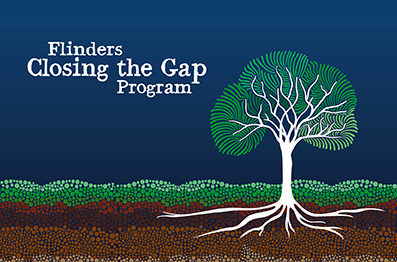What is the Flinders Program?
Originally FHBHRU at Flinders University, developed a generic set of tools known as The Flinders Chronic Condition Management Program (Flinders Program).
The Flinders Program provides a framework for chronic condition management which includes:
- disease management
- self-management
- coordination
- coaching
The Flinders Program enables clinicians and clients to undertake a structured process that allows for assessment of self-management behaviour, collaborative identification of problems and goal-setting, leading to the development of individualised self-management Care Plans. These Care Plans are important cornerstones in enhancing self-management and in providing self-management support for people with chronic conditions.
Aim of the program
The aim of this program is to improve the health outcomes of people living with, or at risk of developing chronic conditions, by empowering them to manage their health and well-being. Health practitioners can play a vital role in developing and supporting the self-management capacity of the clients they work with.
Benefits of the Program
Implementing the Flinders Program provides a person-centered, clinical and psychosocial approach to comprehensive chronic condition management with a focus on skills enhancement in care planning, coordination and self-management support.
Tailored Support
We offer a range of services including training and implementation support and will tailor these to the needs of your organisation. We have training officers based throughout Australia who can provide localised support.
Please note: the current hosting platform to the online Flinders Chronic Condition Management Program is due to be transitioned. New registrations will be unavailable until the new learning platform has been finalised. The timeframe is unknown at this stage. We apologise for any inconvenience this may cause.
Flinders Program Adaptations
The Flinders Program has been used with different populations across diverse settings. Some of the adaptions to date have been…..
Flinders Closing the Gap Program

The life expectancy gap between Aboriginal and Torres Strait Islander people and other Australians is real. There is no simple solution but we know that everyone needs to be prepared to make changes so that clients can take charge of their own health, and in partnership with health workers and their community improve health outcomes. Many Aboriginal and Torres Strait Islander people are living with one or more chronic conditions like depression, diabetes, asthma or kidney disease. Unless conditions like these are treated, managed and prevented, they will shorten lives.
In 2010 FHBHRU received funding from the Commonwealth Department of Health under the Closing the Gap in Indigenous Health Outcomes Initiative. Between 2010 -2014 the Flinders Closing the Gap team engaged with more than 80 organisations across Australia providing implementation and training services, resulting in the development of 6,800 Self-Management Care Plans and nearly 60,000 occasions of service. Aboriginal and Torres Strait Islander people across Australia have contributed to the development and refinement of the program to meet the cultural needs of their communities, many of whom continue to inform the development of resources and are involved in the delivery of training.
The current Flinders Closing the Gap Program (FCTG) has been adapted specifically for use with Aboriginal and Torres Strait Islander people and aims to assist Aboriginal and Torres Strait Islander clients to better understand their health problems and to develop goals to help co-manage their condition in partnership with health professionals. This is achieved through assisting health services to incorporate the Flinders Care Plan in the delivery of services to Aboriginal and Torres Strait Islander people, as well training staff in the Flinders Closing the Gap Program.
Living Well, Smoke Free Program

Tobacco Management training is an extension of the current Flinders Closing the Gap Chronic Condition training program. Tobacco smoking is the leading cause of chronic health conditions in Aboriginal and Torres Strait Islander communities.
The central module provides an understanding of tobacco use in Indigenous communities, historically and currently, and skills to provide behavioural and pharmacological interventions to reduce tobacco use with smokers. Extension modules provide the opportunity to hone skills in working with groups or with clients who have mental health, alcohol or drug use problems.
The training focus has a three-pronged approach, including:
- methods for working directly with smokers
- skills to provide a comprehensive, strategic approach to changing attitudes and ways of managing tobacco across the community
- providing a united approach in supporting positive practices with managing tobacco in the workplace
The National Closing the Gap program has identified tobacco smoking as the single most important intervention that has the potential to close the gap in life expectancy between Aboriginal and Torres Strait Islander people and other Australians.
Living Well, Keeping Strong Program
Living Well Keeping Strong is a self-management approach for people of all ages to make positive changes in their lives in relation to ‘risky behaviours’ such as alcohol, tobacco, problem gambling, marijuana and other substances, nutrition and physical inactivity. It is also possible to apply this approach to other behaviours stemming from experiences of stress, anger, worry and loss.
The training provides an understanding of risky behaviours and a wide range of resources and techniques that can be used flexibly to engage people in the process of general behaviour change, from brief discussions through to the development of personalised action plans. The social determinants underlying health form part of the group discussions.
Coordinated Veterans' Care Program
 The Flinders Program has been adapted for veterans through the Coordinated Veterans’ Care (CVC) Program. In 2011 the Department of Veterans’ Affairs (DVA) commissioned Flinders Human Behaviour & Health Research Unit (FHBHRU) to develop online training and resources in Chronic Disease Management for the Coordinated Veterans’ Care (CVC) Program.
The Flinders Program has been adapted for veterans through the Coordinated Veterans’ Care (CVC) Program. In 2011 the Department of Veterans’ Affairs (DVA) commissioned Flinders Human Behaviour & Health Research Unit (FHBHRU) to develop online training and resources in Chronic Disease Management for the Coordinated Veterans’ Care (CVC) Program.
The CVC Program is a planned and coordinated health care model for eligible Gold Card holders with one or more chronic conditions, complex care needs and who are at risk of unplanned hospitalisation. In particular it is targeted at veterans with one or more of the following conditions:
- congestive heart failure
- coronary artery disease
- pneumonia
- chronic obstructive pulmonary disease
- diabetes.
The model of health care within the CVC Program involves an ongoing partnership between a core team and is based around the development of a personalised comprehensive Care Plan. The core team consists of the veteran, the veteran’s carer (if applicable), the General Practitioner (GP) and a nurse coordinator, who is a practice nurse (PN), Aboriginal health worker (AHW) or community nurse (CN). The team uses care planning, coordination and review to focus on planned and coordinated management and self-management support of the veteran’s health to incorporate the multidisciplinary team in primary and community care. Regular communication, empowerment and coaching are the keys to the success of the team.
The online training program provides primary health care professionals with competencies in best practice care coordination and chronic disease management, including self-management support, and is based on the Flinders Chronic Condition Management Program. This program provides a person centred, clinical and psychosocial approach to comprehensive chronic condition management with a focus on skills enhancement in practice management and support, care planning and coordination and self-management support, and disease-specific and social care support.
Acknowledgement
FHBHRU, originally the Coordinated Care Training Unit (CCTU), was established to provide support and training for service coordinators and general practitioners during the SA HealthPlus Trial from 1997-1998. The SA HealthPlus Trial was one of the larger of the first round of Coordinated Care Trials, enrolling 3100 clients into its intervention arm. The Problem and Goals Assessment was used routinely with all SA HealthPlus intervention clients.
The tools and processes that are now known as the Flinders Program were developed in response to the outcomes from this trial and further tested and refined during the Sharing Healthcare Initiative 2000-2004, and since then in 7 experimental studies.
The success of any project depends largely on the support and assistance of many others. We would sincerely like to thank those people and groups who have been instrumental to the successful development of this program, in particular the Aboriginal Health Council of South Australia.
We acknowledge the Aboriginal and Torres Strait Islander people as the traditional owners of this land and honour their ongoing connection with country and community. We pay our respect to the richness and diversity of cultures, and to the Elders, both past and present.

